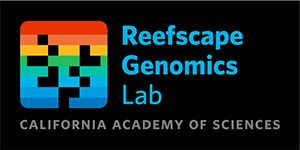The Reefscape Genomics Laboratory at the California Academy of Sciences combines underwater 3D imaging and genome sequencing approaches to advance our understanding of coral reef biodiversity, address critical knowledge gaps for conservation and restoration efforts, and inspire the next generation of environmental stewards.

Our research aims to understand the ecological and evolutionary processes that drive patterns of biodiversity, from genomes to communities, across the coral reef landscape (or “reefscape”). We do this through a “reefscape genomics” approach, where we use population genomic methods in conjunction with 3D imaging to simultaneously characterize the genomes, environments, and phenotypes of coral reef organisms. To better understand and leverage the natural capacity of reef organisms to adapt to different and changing environmental conditions, we conduct our studies across a large series of permanent plots covering both shallow and mesophotic environments. To study the full depth range of coral reefs, we are continually pushing the boundaries of underwater technologies, such as our use of closed-circuit rebreathers and the active development of open source instrumentation.

We are a hybrid lab physically based at the California Academy of Sciences in San Francisco, but with lab members working from different locations across the globe. Our current work is supported through the “Hope for Reefs” initiative at the California Academy of Sciences, the National Science Foundation (NSF), the Natural Sciences and Engineering Research Council (NSERC), and Nvidia, among others.
In this lab, we believe that science is real, Black lives matter, feminism is for everyone, and diversity of all kinds is critical and enriching.
As a lab, we acknowledge that the California Academy of Sciences sits on the stolen, unceded land of the Ramaytush Ohlone. We acknowledge the historic exclusion and erasure of Indigenous peoples from the lands and seas from which we work, and this acknowledgment serves as the beginning of an ongoing commitment to reflect on our own complicity and to dismantle the lasting legacies of settler colonialism. Our department’s anti-racist action plan can be found here.
